Benefits of Custom Orthotics
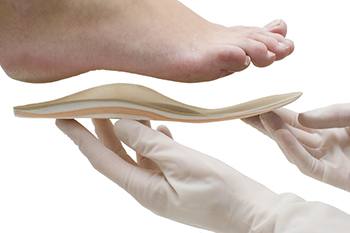
Foot orthotics, whether over-the-counter or custom-made, are specialized insoles designed to address various foot and gait-related issues. They work by correcting imbalances in foot structure and gait, improving posture, and relieving pain through support and pressure redistribution. Custom orthotics, which are molded to the individual's foot shape, offer a personalized fit ideal for specific alignment problems, pathologies, or deformities. They aid in healing by reducing strain on injured areas and can prevent conditions like stress fractures, tendonitis, and tendon rupture. Orthotics also provide cushioning, shock absorption, and enhanced stability, thereby reducing the risk of falls. Athletes can benefit from custom foot orthotics by improving foot support, limiting shock, and reducing tendon stress. This can enhance performance while minimizing injury risk. Over-the-counter insoles may offer basic comfort but lack the effectiveness of custom orthotics. This makes custom orthotics the preferred choice for those with unique foot-related needs. It is suggested that you make an appointment with a podiatrist to ensure the proper fit and function of orthotics tailored to your individual foot needs.
If you are having discomfort in your feet and would like to try orthotics, contact Harvey Jacobs, DPM from Quality Foot Care Center. Our doctor can provide the care you need to keep you pain-free and on your feet.
What Are Orthotics?
Orthotics are inserts you can place into your shoes to help with a variety of foot problems such as flat feet or foot pain. Orthotics provide relief and comfort for minor foot and heel pain but can’t correct serious biomechanical problems in your feet.
Over-the-Counter Inserts
Orthotics come in a wide variety of over-the-counter inserts that are used to treat foot pain, heel pain, and minor problems. For example, arch supports can be inserted into your shoes to help correct overarched or flat feet, while gel insoles are often used because they provide comfort and relief from foot and heel pain by alleviating pressure.
Prescription Orthotics
If over-the-counter inserts don’t work for you or if you have a more severe foot concern, it is possible to have your podiatrist prescribe custom orthotics. These high-quality inserts are designed to treat problems such as abnormal motion, plantar fasciitis, and severe forms of heel pain. They can even be used to help patients suffering from diabetes by treating foot ulcers and painful calluses and are usually molded to your feet individually, which allows them to provide full support and comfort.
If you are experiencing minor to severe foot or heel pain, it’s recommended to speak with your podiatrist about the possibilities of using orthotics. A podiatrist can determine which type of orthotic is right for you and allow you to take the first steps towards being pain-free.
If you have any questions please contact our office located in Somerset, NJ . We offer the newest diagnostic and treatment technologies for all your foot and ankle needs.
MLS Laser Treatment for Tendon Pain
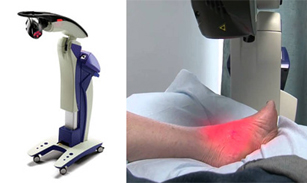
Tendinopathy involves inflammation in and around tendons, often resulting from injury. Low-level laser therapy, which uses monochromatic, coherent, short-wavelength light, has been used since the 1960s to treat tendon injuries. Though investigations are ongoing, some researchers exploring the success of this type of therapy for tendinopathy found that low-level laser therapy consistently shows promise in treating tendinopathy. Patients report improvements in pain, range of motion, and motor function. Combining laser therapy with exercise programs also yielded positive results. If you suffer from tendon pain in your feet or ankles, it is suggested that you make an appointment with a podiatrist to see if this type of treatment can help you.
MLS Laser Therapy is a successful alternative for treating any pain you may be experiencing related to certain podiatric conditions. If you are interested in MLS Laser Therapy, consult with Harvey Jacobs, DPM from Quality Foot Care Center. Our doctor will assess your condition and provide you with quality foot and ankle treatment.
MLS Laser Therapy
Multiwave Locked System (MLS) Laser Therapy is a patented, FDA-cleared technology that helps relieve pain and inflammation from a number of podiatric conditions, including:
- Heel Pain
- Plantar Fasciitis
- Sports Injuries
- Wounds
- Achilles Tendonitis
- Arthritis
- Neuropathy
- Neuromas
MLS Laser Therapy is an ideal alternative to surgery and prescription medication, as it has no negative side effects and encourages accelerated healing. Among its many clinical benefits, MLS Laser Therapy also:
- Reduces swelling due to bruising or inflammation
- Blocks pain
- Reduces formation of scar tissue
- Improves nerve function
If you have any questions, please feel free to contact our office located in Somerset, NJ . We offer the newest diagnostic and treatment technologies for all your foot care needs.
Arthritis Can Cause Pain in the Feet and Ankles
Exploring the Common Causes of Heel Pain
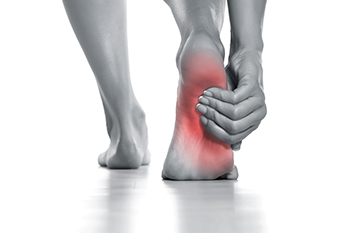
Heel pain is a prevalent complaint that can hinder daily activities and mobility. One of the primary culprits is plantar fasciitis, an inflammation of the plantar fascia, a broad band of tissue that runs across the bottom of the foot. This condition often results from overuse, wearing improper footwear, or excessive weight-bearing. Achilles tendinitis is another frequent source of heel pain, affecting the Achilles tendon at the back of the heel. It can stem from intense physical activity, tight calf muscles, or inadequate warm-up. Heel spurs, which are bony growths on the underside of the heel bone, can lead to discomfort, although they do not always cause pain. Other causes may include stress fractures, arthritis, or nerve irritation. Wearing unsupportive shoes, sudden increases in activity levels, and obesity can make heel pain worse. Treatment options range from rest, stretching exercises, and orthotics to more invasive interventions, depending on the severity and cause of the pain. If you have heel pain, it is strongly suggested that you consult a podiatrist who can accurately determine the cause and offer appropriate treatment options.
Many people suffer from bouts of heel pain. For more information, contact Harvey Jacobs, DPM of Quality Foot Care Center. Our doctor can provide the care you need to keep you pain-free and on your feet.
Causes of Heel Pain
Heel pain is often associated with plantar fasciitis. The plantar fascia is a band of tissues that extends along the bottom of the foot. A rip or tear in this ligament can cause inflammation of the tissue.
Achilles tendonitis is another cause of heel pain. Inflammation of the Achilles tendon will cause pain from fractures and muscle tearing. Lack of flexibility is also another symptom.
Heel spurs are another cause of pain. When the tissues of the plantar fascia undergo a great deal of stress, it can lead to ligament separation from the heel bone, causing heel spurs.
Why Might Heel Pain Occur?
- Wearing ill-fitting shoes
- Wearing non-supportive shoes
- Weight change
- Excessive running
Treatments
Heel pain should be treated as soon as possible for immediate results. Keeping your feet in a stress-free environment will help. If you suffer from Achilles tendonitis or plantar fasciitis, applying ice will reduce the swelling. Stretching before an exercise like running will help the muscles. Using all these tips will help make heel pain a condition of the past.
If you have any questions please contact our office located in Somerset, NJ . We offer the newest diagnostic and treatment technologies for all your foot and ankle needs.
Diabetic Foot Ulcers
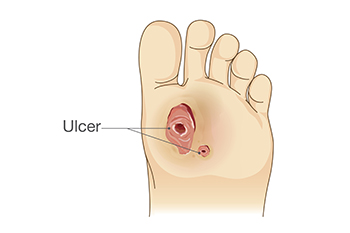
A foot ulcer is defined as any break in the skin. It is the most common type of diabetic foot wound and can lead to loss of functioning and severe complications. These foot wounds often result from factors such as poor blood sugar control, diabetic peripheral neuropathy, and abnormal foot mechanics due to deformities. Diabetic peripheral neuropathy, a side effect of diabetes, can also lead to a loss of protective sensation in the feet, making early injury detection challenging. The assessment of the diabetic foot involves a comprehensive foot and body examination. This can consist of assessing risk factors, undergoing a dermatologic and musculoskeletal evaluation, and having neurologic tests that can determine the degree of sensation. Treatment of diabetic foot ulcers includes debridement, wound culturing, and wound dressings. Additionally, it is important to monitor glycemic control and infection control. Their prevention and management are essential to improve the patient’s quality of life. If you have diabetes and have developed a foot wound or any other foot condition, it is strongly suggested that you make an appointment with a podiatrist who can evaluate your situation, and receive the appropriate treatment.
Wound care is an important part in dealing with diabetes. If you have diabetes and a foot wound or would like more information about wound care for diabetics, consult with Harvey Jacobs, DPM from Quality Foot Care Center. Our doctor will assess your condition and provide you with quality foot and ankle treatment.
What Is Wound Care?
Wound care is the practice of taking proper care of a wound. This can range from the smallest to the largest of wounds. While everyone can benefit from proper wound care, it is much more important for diabetics. Diabetics often suffer from poor blood circulation which causes wounds to heal much slower than they would in a non-diabetic.
What Is the Importance of Wound Care?
While it may not seem apparent with small ulcers on the foot, for diabetics, any size ulcer can become infected. Diabetics often also suffer from neuropathy, or nerve loss. This means they might not even feel when they have an ulcer on their foot. If the wound becomes severely infected, amputation may be necessary. Therefore, it is of the upmost importance to properly care for any and all foot wounds.
How to Care for Wounds
The best way to care for foot wounds is to prevent them. For diabetics, this means daily inspections of the feet for any signs of abnormalities or ulcers. It is also recommended to see a podiatrist several times a year for a foot inspection. If you do have an ulcer, run the wound under water to clear dirt from the wound; then apply antibiotic ointment to the wound and cover with a bandage. Bandages should be changed daily and keeping pressure off the wound is smart. It is advised to see a podiatrist, who can keep an eye on it.
If you have any questions, please feel free to contact our office located in Somerset, NJ . We offer the newest diagnostic and treatment technologies for all your foot care needs.
Causes and Solutions for Second Toe Pain
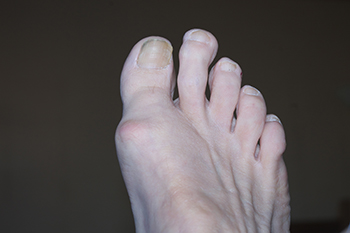
Second toe pain can be a bothersome and discomforting issue, impacting your daily activities and quality of life. Understanding the potential causes and effective treatments is crucial for finding relief and maintaining optimal foot health. One common culprit of second toe pain is wearing improperly fitting shoes. Tight, narrow, or pointy shoes can compress the toes, leading to discomfort and deformities such as hammertoes. High heels, which force excessive weight onto the toes, can exacerbate this problem. Another frequent cause is overuse or repetitive stress, often seen in athletes or individuals engaged in activities that involve pushing off with the toes. This can lead to conditions that can include metatarsalgia or stress fractures. To address second toe pain, begin by wearing comfortable, properly fitting shoes with adequate toe room. Wearing custom orthotics can provide additional support and alleviate pressure. Rest, and taking over-the-counter pain relievers can help manage acute pain, and exercises may be beneficial for chronic issues. If second toe pain persists or worsens, it is suggested that you consult a podiatrist for a proper diagnosis and tailored treatment plan.
Toe pain can disrupt your daily activities. If you have any concerns, contact Harvey Jacobs, DPM of Quality Foot Care Center. Our doctor can provide the care you need to keep you pain-free and on your feet.
What Causes Toe Pain?
Most severe toe pain is caused due to a sports injury, trauma from dropping something heavy on the toe, or bumping into something rigid. Other problems can develop over time for various reasons.
Toe pain can be caused by one or more ailments. The most common include:
- Trauma
- Sports injury
- Wearing shoes that are too tight
- Arthritis
- Gout
- Corns and calluses
- Hammertoe
- Bunions
- Blisters
- Ingrown toenails
- Sprains
- Fractures (broken bones)
- Dislocations
When to See a Podiatrist
- Severe pain
- Persistent pain that lasts more than a week
- Signs of infection
- Continued swelling
- Pain that prevents walking
Diagnosis
In many cases the cause of toe pain is obvious, but in others, a podiatrist may want to use more advanced methods to determine the problem. These can range from simple visual inspections and sensation tests to X-rays and MRI scans. Prior medical history, family medical history, and any recent physical traumatic events will all be taken into consideration for a proper diagnosis.
Treatment
Treatments for toe pain and injuries vary and may include shoe inserts, padding, taping, medicines, injections, and in some cases, surgery. If you believe that you have broken a toe, please see a podiatrist as soon as possible.
If you have any questions please feel free to contact our office located in Somerset, NJ . We offer the newest diagnostic tools and technology to treat your foot and ankle needs.
Common Foot Problems in Children

Children's feet are essential for their overall health and development. However, various foot problems can affect children as they grow. Flat feet, or pes planus, is a common condition where the arches on the inside of the feet do not develop fully, making the entire sole touch the ground. While this is normal in infants, it should resolve as they age. Ingrown toenails can cause pain, redness, and swelling, often the result of improper nail trimming or tight shoes. Proper nail care and footwear are key to preventing this issue. Sever's disease, medically termed calcaneal apophysitis, is common in active children between the ages of 8 and 14. It affects the growth plate in the heel and causes heel pain, especially during physical activities. Deformities, such as clubfoot, curly toes or overlapping toes, can be present from birth or develop later. Early intervention can help correct these deformities. Parents may wish to regularly inspect their children's feet and seek the help of a podiatrist for any of these common foot problems.
The health of a child’s feet is vital to their overall well-being. If you have any questions regarding foot health, contact Harvey Jacobs, DPM of Quality Foot Care Center. Our doctor can provide the care you need to keep you pain-free and on your feet.
Tips for Keeping Children's Feet Healthy
- Make sure their shoes fit properly
- Look for any signs of in-toeing or out-toeing
- Check to see if they have Clubfoot (condition that affects your child’s foot and ankle, twisting the heel and toes inward) which is one of the most common nonmajor birth defects.
- Lightly cover your baby’s feet (Tight covers may keep your baby from moving their feet freely, and could prevent normal development)
- Allow your toddler to go shoeless (Shoes can be restricting for a young child’s foot)
- Cut toenails straight across to avoid ingrown toenails
- Keep your child’s foot clean and dry
- Cover cuts and scrapes. Wash any scratches with soap and water and cover them with a bandage until they’ve healed.
If you have any questions, please feel free to contact our office located in Somerset, NJ . We offer the newest diagnostic and treatment technologies for all your foot care needs.
Gout Pain Can Be Managed
Causes and Symptoms of Morton’s Neuroma
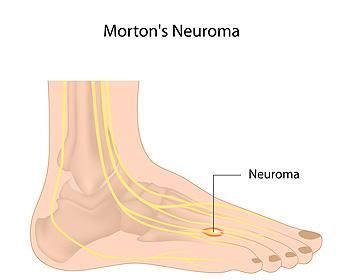
Morton's neuroma, a painful condition affecting the feet, can develop due to a combination of factors. One primary factor is biomechanical issues within the feet, such as having flat feet or high arches. These structural variations can place excessive stress on the toe joints, leading to repeated irritation of the nerve. Tight calf muscles, which limits ankle movement, are another contributor to this condition. When the ankle's range of motion is restricted, it can result in increased pressure on the balls of the feet, further aggravating the situation. Additionally, footwear choices play a significant role in developing Morton’s neuroma. Wearing narrow, high heeled or tight fitting shoes compresses the nerves and puts pressure on the forefoot. Some patients report a persistent aching or burning sensation, frequently occurring between the third and fourth toes. This discomfort is often accompanied by sharp, shooting pains in the ball of the foot, which can extend into the toes and create additional discomfort. Some patients liken the sensation to having a foreign object such as a pebble or stone, trapped inside their shoe. Tingling and pricking sensations in the toes are also prevalent and contribute to the overall discomfort associated with Morton's neuroma. If you believe you may have Morton’s neuroma, it is suggested that you make an appointment with a podiatrist.
Morton’s neuroma is a very uncomfortable condition to live with. If you think you have Morton’s neuroma, contact Harvey Jacobs, DPM of Quality Foot Care Center. Our doctor will attend to all of your foot care needs and answer any of your related questions.
Morton’s Neuroma
Morton's neuroma is a painful foot condition that commonly affects the areas between the second and third or third and fourth toe, although other areas of the foot are also susceptible. Morton’s neuroma is caused by an inflamed nerve in the foot that is being squeezed and aggravated by surrounding bones.
What Increases the Chances of Having Morton’s Neuroma?
- Ill-fitting high heels or shoes that add pressure to the toe or foot
- Jogging, running or any sport that involves constant impact to the foot
- Flat feet, bunions, and any other foot deformities
Morton’s neuroma is a very treatable condition. Orthotics and shoe inserts can often be used to alleviate the pain on the forefront of the feet. In more severe cases, corticosteroids can also be prescribed. In order to figure out the best treatment for your neuroma, it’s recommended to seek the care of a podiatrist who can diagnose your condition and provide different treatment options.
If you have any questions, please feel free to contact our office located in Somerset, NJ . We offer the newest diagnostic and treatment technologies for all your foot care needs.
Foot Problems Caused by Diabetes
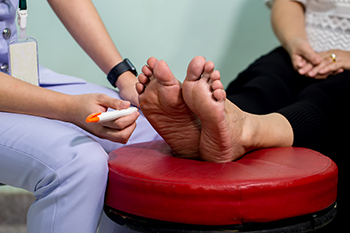
For anyone living with diabetes, understanding potential foot problems and how to address them is of great importance. Conditions resulting from diabetes that can lead to significant foot issues are loss of protective sensation, also known as LOPS, and peripheral artery disease, or PAD. The former refers to the loss of feeling in the feet. This loss of sensation can prevent you from noticing discomfort, such as a pebble in your shoe or a cut or blister on your foot. Consequently, you might not realize when your skin is being injured, which increases the risk of infected sores. Ill-fitting shoes, foreign objects in shoes, sharp items on the ground, and extreme temperatures can all cause harm. Equally problematic is peripheral artery disease, which reduces blood flow to the feet. This can lead to pain, delayed wound healing, and the formation of foot ulcers. Individuals with PAD are at an increased risk of limb loss unless immediate action is taken. Regularly checking and safeguarding your feet, wearing well-fitting shoes, and seeking professional nail care are necessary steps to be taken daily. For help with foot issues caused by diabetes, it is suggested that you have a podiatrist on your team of medical professionals.
Diabetic foot care is important in preventing foot ailments such as ulcers. If you are suffering from diabetes or have any other concerns about your feet, contact Harvey Jacobs, DPM from Quality Foot Care Center. Our doctor can provide the care you need to keep you pain-free and on your feet.
Diabetic Foot Care
Diabetes affects millions of people every year. The condition can damage blood vessels in many parts of the body, especially the feet. Because of this, taking care of your feet is essential if you have diabetes, and having a podiatrist help monitor your foot health is highly recommended.
The Importance of Caring for Your Feet
- Routinely inspect your feet for bruises or sores.
- Wear socks that fit your feet comfortably.
- Wear comfortable shoes that provide adequate support.
Patients with diabetes should have their doctor monitor their blood levels, as blood sugar levels play such a huge role in diabetic care. Monitoring these levels on a regular basis is highly advised.
It is always best to inform your healthcare professional of any concerns you may have regarding your feet, especially for diabetic patients. Early treatment and routine foot examinations are keys to maintaining proper health, especially because severe complications can arise if proper treatment is not applied.
If you have any questions please feel free to contact our office located in Somerset, NJ . We offer the newest diagnostic and treatment technologies for all your foot and ankle needs.
More...
How to Deal With Toe Fractures
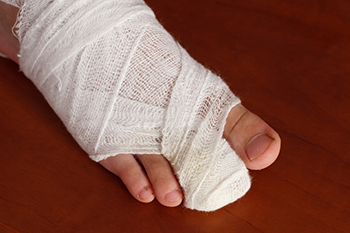 Common symptoms of a broken, or fractured, toe include pain, swelling, and a change in skin color due to bruising or bleeding under the skin. If these symptoms persist for more than a few days or hinder walking and wearing shoes, it is advisable to seek help from a podiatrist. The causes of a broken toe are typically related to accidents and injuries. Dropping something heavy on the foot or stubbing the toe against a hard object are the most common causes. A broken toe may include the risk of infection if the skin is cut near the injured toe, possibly leading to a chance of bone infection. Additionally, there's a possibility of developing osteoarthritis, a wear-and-tear type of arthritis, particularly if the break affects one of the toe joints. Despite the discomfort and potential complications associated with toe fractures, the most common treatment for a toe fracture is buddy taping, where the injured toe is taped to the one next to it. Wearing rigid-sole shoes can help by limiting joint movement. An immediate visit to a podiatrist may be necessary for certain cases, such as open fractures, significant soft tissue damage, and dislocations. For anyone who is experiencing extreme symptoms of a broken toe or is concerned about potential complications, it is suggested that you make an appointment with a podiatrist.
Common symptoms of a broken, or fractured, toe include pain, swelling, and a change in skin color due to bruising or bleeding under the skin. If these symptoms persist for more than a few days or hinder walking and wearing shoes, it is advisable to seek help from a podiatrist. The causes of a broken toe are typically related to accidents and injuries. Dropping something heavy on the foot or stubbing the toe against a hard object are the most common causes. A broken toe may include the risk of infection if the skin is cut near the injured toe, possibly leading to a chance of bone infection. Additionally, there's a possibility of developing osteoarthritis, a wear-and-tear type of arthritis, particularly if the break affects one of the toe joints. Despite the discomfort and potential complications associated with toe fractures, the most common treatment for a toe fracture is buddy taping, where the injured toe is taped to the one next to it. Wearing rigid-sole shoes can help by limiting joint movement. An immediate visit to a podiatrist may be necessary for certain cases, such as open fractures, significant soft tissue damage, and dislocations. For anyone who is experiencing extreme symptoms of a broken toe or is concerned about potential complications, it is suggested that you make an appointment with a podiatrist.
A broken toe can be very painful and lead to complications if not properly fixed. If you have any concerns about your feet, contact Harvey Jacobs, DPM from Quality Foot Care Center. Our doctor will treat your foot and ankle needs.
What to Know About a Broken Toe
Although most people try to avoid foot trauma such as banging, stubbing, or dropping heavy objects on their feet, the unfortunate fact is that it is a common occurrence. Given the fact that toes are positioned in front of the feet, they typically sustain the brunt of such trauma. When trauma occurs to a toe, the result can be a painful break (fracture).
Symptoms of a Broken Toe
- Throbbing pain
- Swelling
- Bruising on the skin and toenail
- The inability to move the toe
- Toe appears crooked or disfigured
- Tingling or numbness in the toe
Generally, it is best to stay off of the injured toe with the affected foot elevated.
Severe toe fractures may be treated with a splint, cast, and in some cases, minor surgery. Due to its position and the pressure it endures with daily activity, future complications can occur if the big toe is not properly treated.
If you have any questions please feel free to contact our office located in Somerset, NJ . We offer the newest diagnostic and treatment technologies for all your foot and ankle needs.
Understanding Why Women's Heels Crack
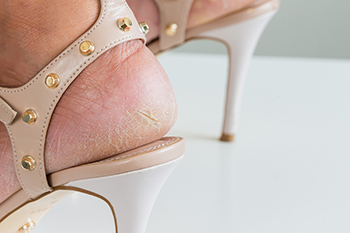
In the intricate world of skincare and beauty, cracked heels is a perplexing issue that often plagues many women. These unsightly and often uncomfortable crevices can leave anyone feeling puzzled and frustrated. The culprits behind this phenomenon, however, are not merely superficial. Dry skin, a common cause, occurs as a result of factors such as climate, footwear choices, and lack of proper moisturization. Additionally, prolonged standing or walking can exacerbate the problem, leading to excessive pressure on the heels. Neglecting foot care routines and failing to keep feet adequately hydrated can also contribute to getting cracked heels. While these factors affect individuals differently, a combination of preventive measures consisting of regular exfoliation, wearing appropriate footwear, and moisturizing can help bid farewell to cracked heels, ensuring that each step is a comfortable and confident one. If you would like more information about cracked heels and effective prevention methods, it is suggested that you consult a podiatrist.
Cracked heels are unsightly and can cause further damage to your shoes and feet. If you have any concerns, contact Harvey Jacobs, DPM from Quality Foot Care Center. Our doctor can provide the care you need to keep you pain-free and on your feet.
Cracked Heels
Cracked heels appear unappealing and can make it harder for you walk around in sandals. Aside from looking unpleasant, cracked heels can also tear stockings, socks, and wear out your shoes. There are several methods to help restore a cracked heel and prevent further damage.
How Do You Get Them?
Dry skin is the number one culprit in creating cracked heels. Many athletes, walkers, joggers, and even swimmers suffer from cracked heels. Age and skin oil production play a role to getting cracked heels as well.
Promote Healing
Over the counter medicines can help, especially for those that need instant relief or who suffer from chronic dry feet.
Wear Socks – Wearing socks with medicated creams helps lock in moisture.
Moisturizers – Applying both day and night will help alleviate dryness which causes cracking.
Pumice Stones – These exfoliate and remove dead skin, which allows for smoother moisturizer application and better absorption into the skin.
Change in Diet
Eating healthy with a well-balanced diet will give the skin a fresh and radiant look. Your body responds to the kinds of food you ingest. Omega-3 fatty acids and zinc supplements can also revitalize skin tissue.
Most importantly, seek professional help if unsure how to proceed in treating cracked heels. A podiatrist will help you with any questions or information needed.
If you have any questions, please feel free to contact our office located in Somerset, NJ . We offer the newest diagnostic and treatment technologies for all your foot care needs.
Are Bunions Affecting Your Everyday Life?
Types and Locations of Ankle Sprains
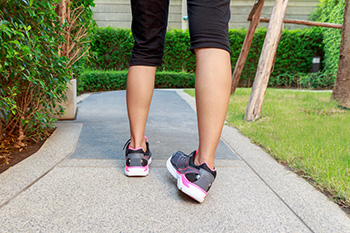
Ankle sprains are common injuries that can occur during various physical activities. Ankle sprains are categorized into three degrees based on the severity of the ligament damage. A first-degree ankle sprain is mild, with stretched ligaments and minimal fiber damage. A second-degree sprain is more moderate, involving partially torn ligaments. The most severe type is a third-degree sprain, where ligaments are completely torn. Two main types of sprains are inversion and eversion. Inversion sprains occur when the foot twists inward, stretching the outer ligaments and causing pain on the outside of the ankle. Eversion sprains occur when the foot twists outward, stretching the inner ligaments and causing pain on the inside of the ankle. Ankle sprains can also also be classified based on their location. Lateral sprains occur on the outside of the ankle and makeup about 80 percent of all sprains. High, or syndesmotic, ankle sprains are rarer, seen in around 15 percent of ankle sprains. Medial sprains account for about 5 percent of all ankle sprains. Treatment for ankle sprains varies depending on the severity and location. It is suggested that you make an appointment with a podiatrist for a proper diagnosis and personalized treatment plan.
Ankle sprains are common but need immediate attention. If you need your feet checked, contact Harvey Jacobs, DPM from Quality Foot Care Center. Our doctor can provide the care you need to keep you pain-free and on your feet.
How Does an Ankle Sprain Occur?
Ankle sprains take place when the ligaments in your ankle are torn or stretched beyond their limits. There are multiple ways that the ankle can become injured, including twisting or rolling over onto your ankle, putting undue stress on it, or causing trauma to the ankle itself.
What Are the Symptoms?
- Mild to moderate bruising
- Limited mobility
- Swelling
- Discoloration of the skin (depending on severity)
Preventing a Sprain
- Wearing appropriate shoes for the occasion
- Stretching before exercises and sports
- Knowing your limits
Treatment of a Sprain
Treatment of a sprain depends on the severity. Many times, people are told to rest and remain off their feet completely, while others are given an air cast. If the sprain is very severe, surgery may be required.
If you have suffered an ankle sprain previously, you may want to consider additional support such as a brace and regular exercises to strengthen the ankle.
If you have any questions please feel free to contact our office located in Somerset, NJ . We offer the newest diagnostic and treatment technologies for all your foot and ankle needs.



